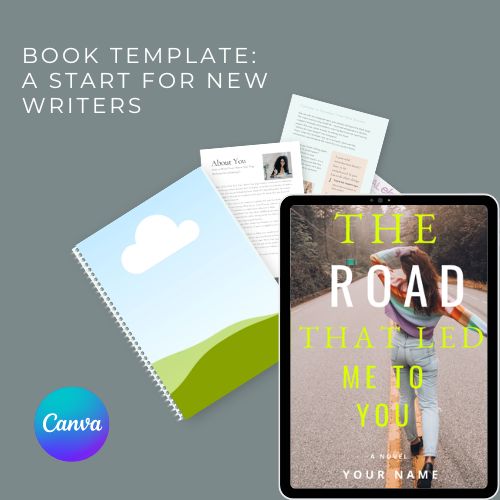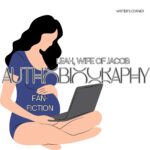I’m so glad you’re here and ready to share your vision and book with the world. God has blessed you with an idea and you’re ready to take the next step. How do you know if you’re ready to write your first book? Maybe you felt a nudge. A calling. Something deep in the heart of your soul that won’t let you forget and keeps you up at night, perhaps it whispers to you—or maybe shouts—telling you it’s time.
I know, I know but you’ve never written a book. Well allow me to let you in on a not so secret, secret. Every writer has felt that before they started writing. So, let’s get you writing. I hope this starter outline helps you along the journey. I pray the Spirit draws near to you as you read these words and brings clarity to your path.
Grab Your Free Book Template Here | Edit In Canva
Let’s Get Started
We’re going to start simple. First question: What do You want your readers to feel and accomplish? A reverse elevator pitch is perfect to jump starting your process.
Tip: Try not to work in timelines, because remember our Father who lives in heaven doesn’t have the same time line as we do. Set goals, but let Him decide when they’re getting that check mark
What kind of book are you called to write? Everyone’s journey looks different, and stay in your own lane, do not compare your journey with their journey.
What Kind of Faith-Centred Book Makes A Great First Book?
Devotional – Bite-sized encouragements paired with scripture, guiding readers day by day.
Testimonial or Memoir – Your story, your scars, and your redemption through Christ. A living witness of His faithfulness.
Children’s Book – Introducing little ones to the love of God through simple words and vibrant storytelling.
Colouring Book – Scripture-based art that lets readers meditate on the Word as they create.
Biblical Guide – A resource that digs into topics like forgiveness, marriage, identity, or prayer, grounded in scripture.
Road Map or Practical Guide – A step-by-step book showing others how to walk through a journey you’ve already survived with God’s help.
Fiction Novel – A story woven with faith at its core. It doesn’t need to be preachy; it can be subtle, allegorical, or filled with symbolism that points back to the truth.
Poetry or Psalms-Inspired Writing – Raw, lyrical expressions of faith that touch hearts on a different level.
Blog-to-Book – Perhaps you’re more of a consistent short-form writer. Blogging can become a powerful outlet for teaching, encouraging, and eventually compiling into a book.
Hybrid Work – Who says you can’t mix? Testimony with devotionals. Fiction with biblical allegory. Children’s story plus colouring elements. God is creative—so can you be.
Now that you’ve got the menu in front of you, take a moment to pray. Ask God to highlight what stirs your spirit. Which of these forms do you find yourself leaning toward? This can be the step that holds the most trial and error (not editing). The moment you decide on what you’re destined to do, how you’re going to serve God’s people, you’ll be met with opposition. DO NOT QUIT. Disruption and opposition is supposed to occur, this is where you’ll gain your strength, your character, and strengthen your purpose.
Write Your Book Today With Our 2 in 1 Author Bundle
Who Is Your First Book For?
Every book has a reader and it’s important for you to know right off the bat, you can’t market to everyone. By trying to reach every reader, you’ll most likely not reach anyone. Decide who you are writing to and start there. Maybe it’s the woman who just came to faith and doesn’t know where to start. Maybe it’s a single mum in the thick of spiritual warfare. Maybe it’s a child who needs to know that God loves them as they are. Clarity here keeps your book from drifting.
What’s the Core Message of Your First Book?
Boil it down. If a reader walks away with just one truth, what should it be?
“God’s love redeems every broken place.”
“You are not fighting alone.”
“Faith is a journey, not a performance.”
Your message becomes the backbone.
How to Build a Simple Structure for Your Faith-Centred Book
You don’t need a 20-chapter outline to start, but you do need a frame:
For devotionals: 30 readings, each with scripture and reflection.
For testimonies: chapters that trace your journey and lessons.
For guides: identify a problem, root it in scripture, offer a Christ-centred solution, and provide action steps.
For fiction: a protagonist, a conflict, a journey that mirrors the spiritual battles we face, and a resolution that carries hope.
For children: a simple story with a clear takeaway.
Grab Your Starter’s Writing Guide Today (Click Here)
Setting a Writing Rhythm for Your Faith-Centred Book
You don’t have to write 2,000 words a day. Start small. Even 300 words. The point is to be consistent. Let prayer set your pace—there will be days God floods you with words, and days when He simply tells you to rest.
Trusting the Process of Writing a Faith-Centred Book
Writing a faith-centred book isn’t about perfection. It’s about obedience. Glorifying the Almighty. Write first, edit later. Expect your first draft to be a work in progress. Don’t expect it to be perfect off the bat, that’s why we call it a first draft. Keep scripture at the centre. Trust the Holy Ghost to lead your words to the ones who need them most. Your job is to write and Father’s job is to lead. Remember the saying, you can lead a horse to water, but you can’t make them drink.
And remember, the vision you’ve been given isn’t random. It’s a seed. If God planted it, He’ll see it through. All you need to do is start.
To leave you with the most important piece of all… Trust in the Lord with all thine heart; and lean not unto thine own understanding. In all thy ways acknowledge him, and he shall direct thy paths. Proverbs 3:5-6
Need Creativity? Read Our Blog “20 Powerful Bible Verses for Writers”
Stay Faithful, Stay Loyal, and Stay writing.
With love and fire,
V.S. Beals
Writer. Watchwoman. Woman of the Word.








